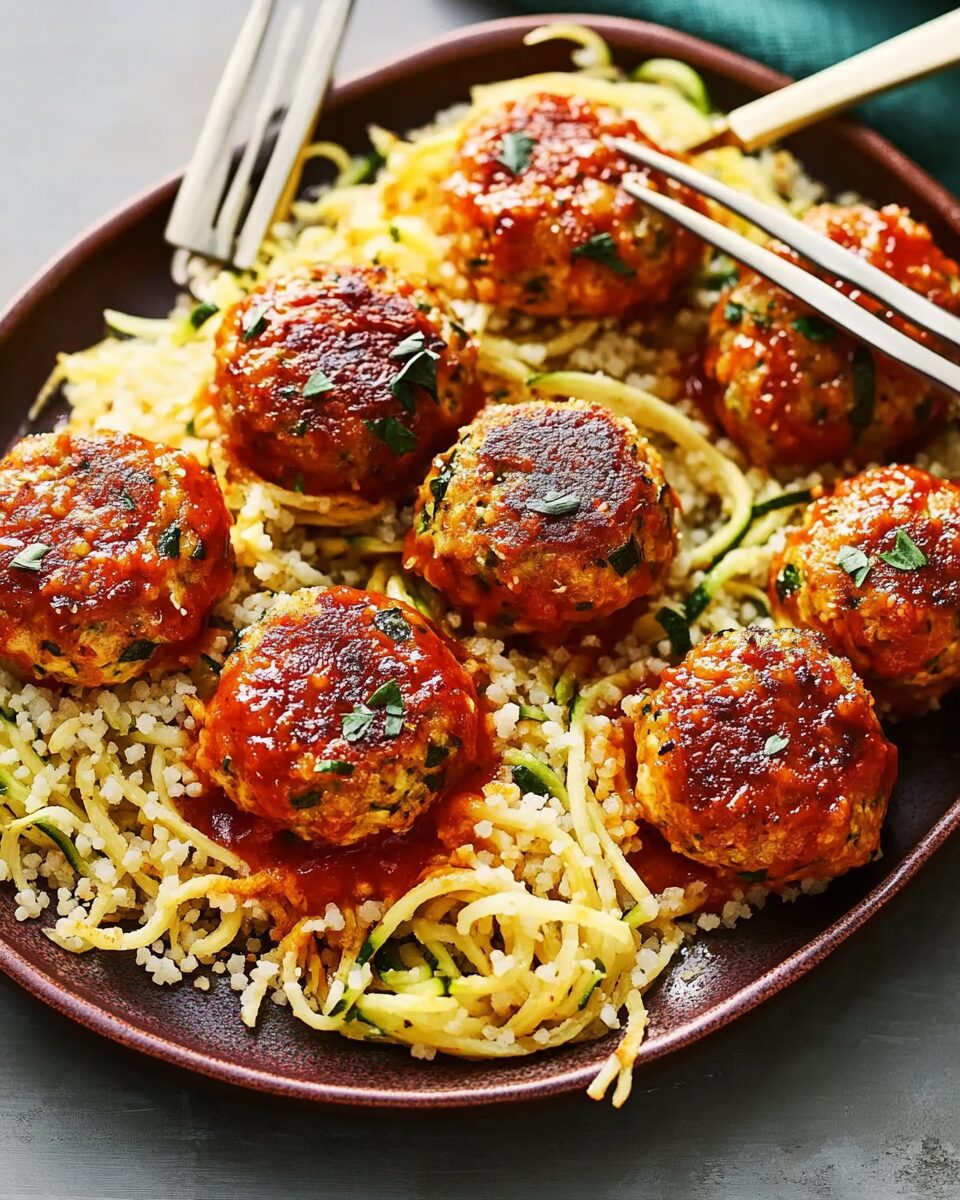What Makes These Veggie Meatballs Special
Unlike many vegetarian “meatballs” that fall apart under heat or crumble in sauce, these are intentionally structured to hold their shape and texture even after baking and saucing. The combination of eggs and couscous acts as a sturdy binder, while the lentils and zucchini give the balls a soft, meaty bite. The halloumi doesn’t melt like other cheeses—it crisps up, giving each meatball tiny pops of caramelized saltiness that contrast beautifully with the tangy tomato sauce.
Another standout quality of this recipe is how seamlessly it fits into a variety of meals. While it’s perfect with pasta, these meatballs are just as delightful served over rice, in grain bowls, or even as a protein-rich topping for a green salad. They also work as a standalone appetizer with dipping sauces or stuffed into a pita for a quick veggie sandwich.
Flavor and Texture Highlights
The flavor profile is Mediterranean and earthy, thanks to the mint, parsley, and cumin. These herbs and spices create a fresh and aromatic base that pairs well with the acidity of the tomato sauce. The texture contrast is key: crispy edges from the baking process, a firm interior from the couscous and lentils, and occasional creamy bites of halloumi.
When baked in the oven, the exterior becomes gorgeously golden without deep-frying, and the interior stays moist and light. Then comes the tomato sauce—rich, savory, and comforting. When you stir the baked meatballs into the sauce and let them simmer briefly, they absorb the flavors without breaking apart, creating a dish that feels slow-cooked and deeply layered in taste.
Nutrition and Health Benefits
One of the strongest aspects of this dish is its nutritional value. Each serving packs in 20 grams of protein, which is impressive for a vegetarian meal. This comes largely from the lentils, eggs, and halloumi—each of which contributes important macronutrients. The dish is rich in fiber from the lentils and zucchini, which supports digestive health and helps keep you full longer.
With a total of 604 calories per serving, this recipe makes for a satisfying main meal that nourishes without overloading. The inclusion of olive oil adds heart-healthy monounsaturated fats, while the herbs contribute antioxidants. Unlike many meat-based meatballs, this version is lower in saturated fat, making it a healthier choice overall without sacrificing satisfaction.
Adaptability and Versatility
These veggie meatballs are incredibly versatile. You can serve them with:
-
Pasta, as in the original recipe
-
On top of creamy polenta
-
Over fluffy couscous or quinoa
-
In a grain bowl with roasted veggies
-
Tucked into a wrap or sandwich with tahini or yogurt sauce
You can also make them ahead of time. The mixture can be prepared a day in advance and kept in the fridge until ready to bake. Cooked meatballs store well in the fridge for several days and freeze beautifully for up to three months, making them perfect for batch cooking and meal prep.
For those who like a bit of heat, you can add chili flakes or harissa to the mixture or the sauce. For a Mediterranean twist, serve with tzatziki, hummus, or baba ghanoush on the side.
Serving Suggestions
When serving with pasta, be sure to reserve some of the pasta cooking water. This starchy liquid helps loosen the sauce and creates a silky coating on the noodles. Grating extra halloumi on top of the dish just before serving adds another layer of cheesy flavor and a salty finish that brings everything together.
Pair this dish with a side salad dressed in lemon vinaigrette, or a side of roasted vegetables for a complete and colorful meal. A chilled glass of white wine, like Sauvignon Blanc or Pinot Grigio, makes the perfect companion for an elegant dinner.
Why You’ll Love This Recipe
These veggie meatballs aren’t just about cutting out meat—they’re about adding flavor, texture, and nutrition in a way that’s both unexpected and deeply satisfying. Whether you’re cooking for a family, hosting vegetarian guests, or just want to eat more plant-based meals, this recipe proves you don’t have to compromise on flavor or indulgence.
They’re easy to make with accessible ingredients, budget-friendly, and great for busy weeknights or weekend dinners. You’ll also love that they’re freezer-friendly and great for leftovers.
If you’ve been skeptical about vegetarian meatballs in the past, this is the recipe that will change your mind.
Conclusion
In a world where plant-based meals are becoming more mainstream, the Ultimate Veggie Meatballs stand out as a recipe that effortlessly balances taste, nutrition, and comfort. With their golden-baked crust, richly flavored interior, and vibrant tomato sauce, these meatballs offer all the indulgence of a traditional comfort dish—without the meat. They’re proof that vegetarian meals can be just as bold, just as hearty, and just as satisfying as their meaty counterparts.
Whether served over pasta, grains, or nestled into a sandwich, these meatballs deliver every time. With minimal prep, flexible storage options, and universal appeal, this recipe is bound to become a go-to favorite in any kitchen. Embrace this vegetarian gem, and discover how fulfilling plant-based cooking can truly be.






